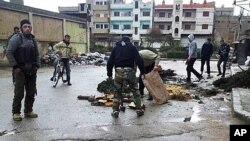Syrian government troops kept up shelling of the protest-hub city of Homs Wednesday, killing more than 70 people including two Western journalists. The shelling continues 17 days of attacks as the International Committee of the Red Cross tries to organize a humanitarian cease-fire.
Showing what appears to be two bodies shrouded by blankets near a staircase piled with rubble, Syrian opposition activist Khaled Abu Salah describes the barrage that killed Marie Colvin, a prominent American war correspondent working for Britain's Sunday Times newspaper, and French photojournalist Remi Ochlik. Activists said several other journalists were wounded in the attack on a makeshift media center in the rebel-held Baba Amr district of Homs.
Fellow opposition activist Selim Qabbani tells Alhurra TV the make-shift press center where the journalists were working appeared to have been deliberately targeted and that the rest of Baba Amr district was also badly hit.
"Government forces fired 11 rockets, shells and mortar rounds at the apartment being used by the journalists -- the situation in Baba Amr is extremely bad, more than 17 civilians were killed Wednesday," he says, explaining that it was difficult to identify the deceased and that government forces are preventing anyone from fleeing the district to seek refuge.
Other opposition activists charge that Syrian reconnaissance planes have been flying over Baba Amr for several days as part of efforts to locate satellite dishes used by foreign journalists.
Paris-based Reporters Without Borders says it is investigating whether Syrian forces deliberately targeted the building.
The Syrian government issued a statement saying it was not aware the journalists were in the country. Syrian state media reported that the Information Ministry was "calling on foreign journalists who have entered Syria illegally to regularize their status with the government."
Syria does not permit foreign journalists to travel freely and has kept most of them out.
A number of international leaders expressed outrage over the killings, including French President Nicholas Sarkozy, who said it is “time for the Syrian regime to go." His comments come ahead of an international gathering in Tunisia on the conflict in Syria.
Political scientist Khattar Abou Diab, a professor of international relations at L’Universite Paris-Sud, says the international community has lost patience with Syrian President Bashar al-Assad after witnessing the brutality of his forces. The killing of foreign journalists, he adds, highlights the greater drama being lived out by Syrian people, who, according to some estimates, have suffered nearly 7,500 deaths, thousands of wounded, and the devastation of several cities during the government's crackdown on dissent.
The French foreign ministry, he says, is demanding that Syria allow free access to the wounded in Homs so that they can be treated.
| Join the conversation on our social journalism site - Middle East Voices. Follow our Middle East reports on Twitter and discuss them on our Facebook page. |




